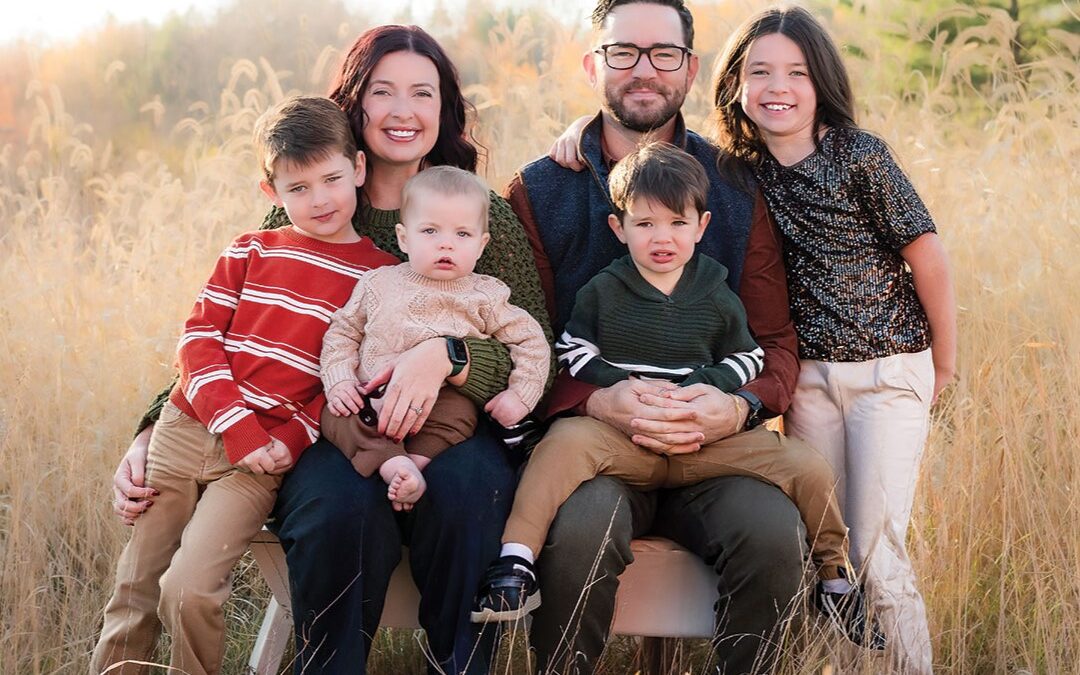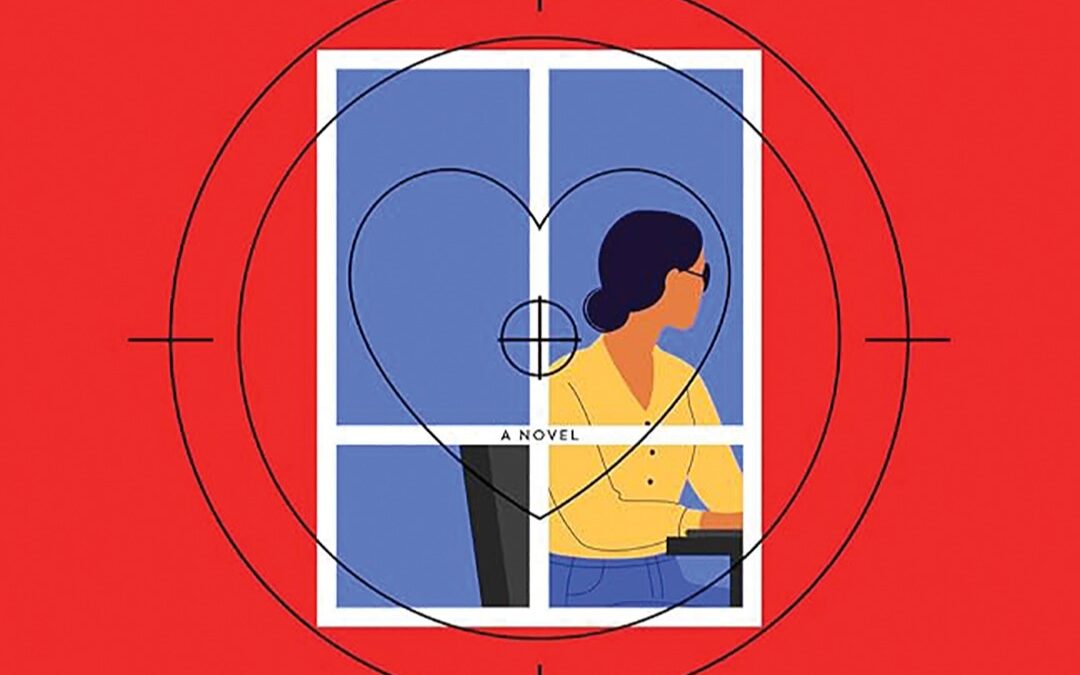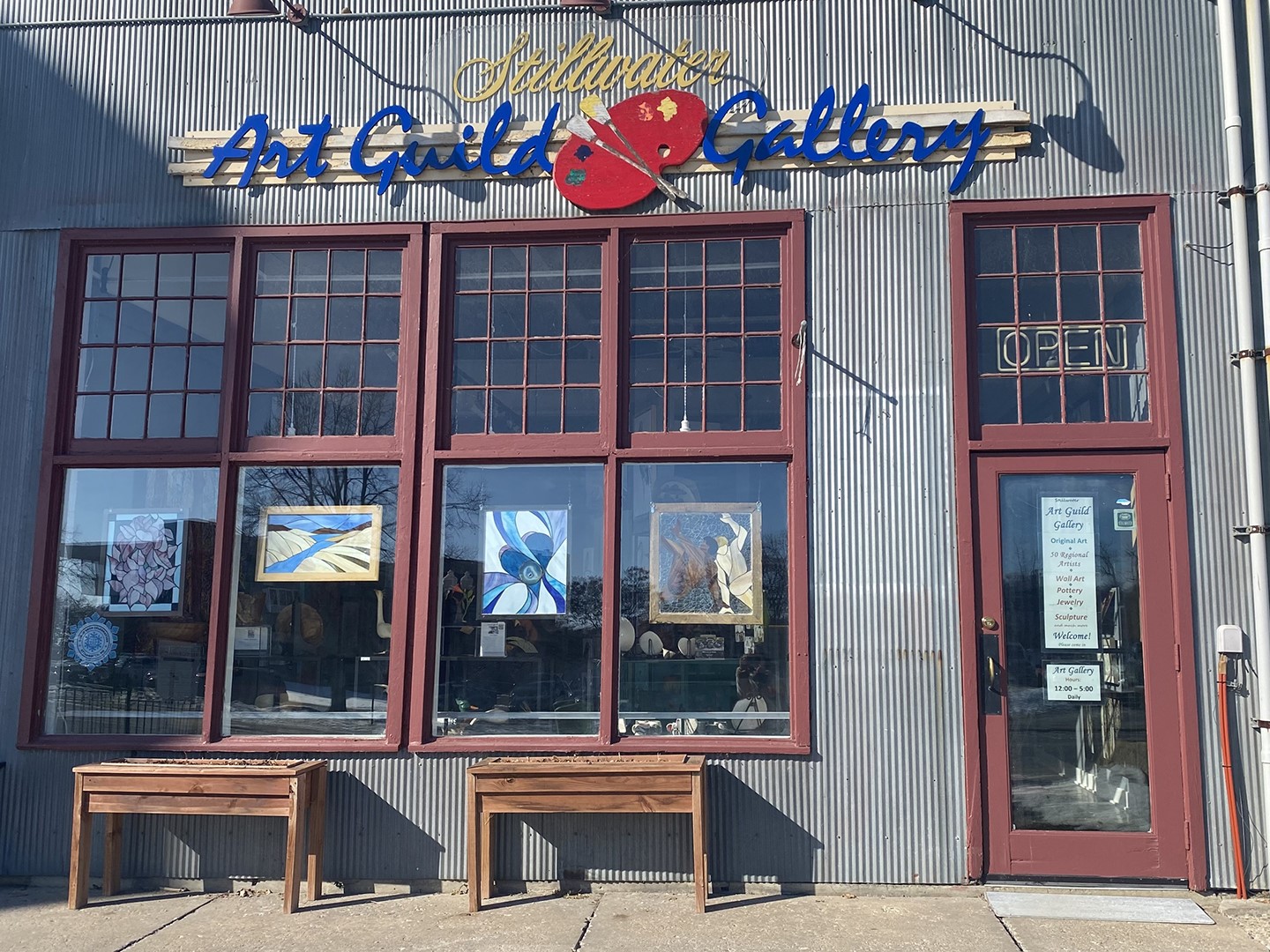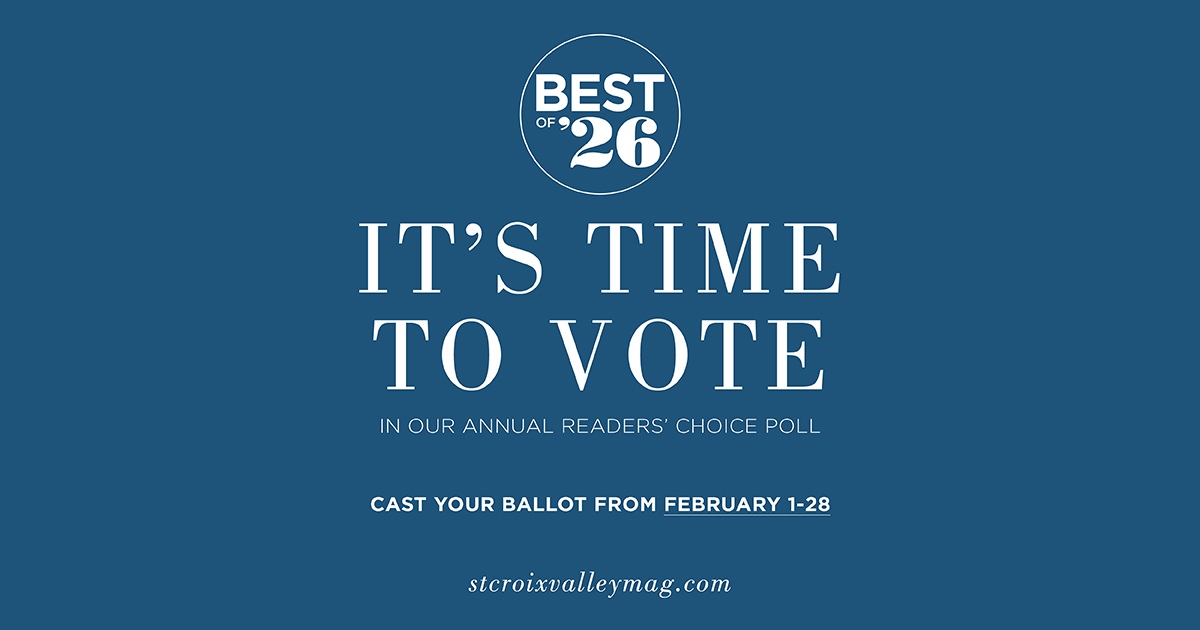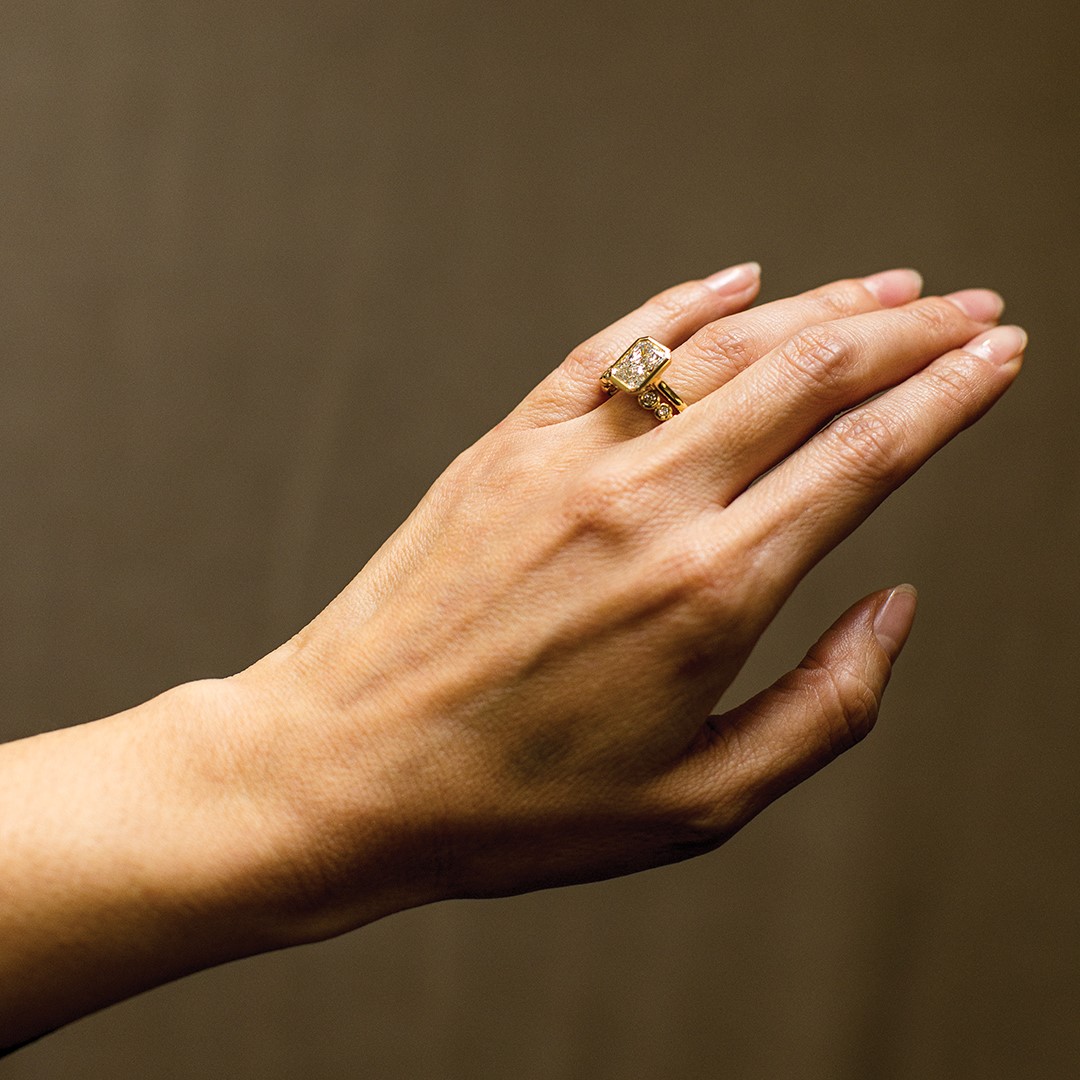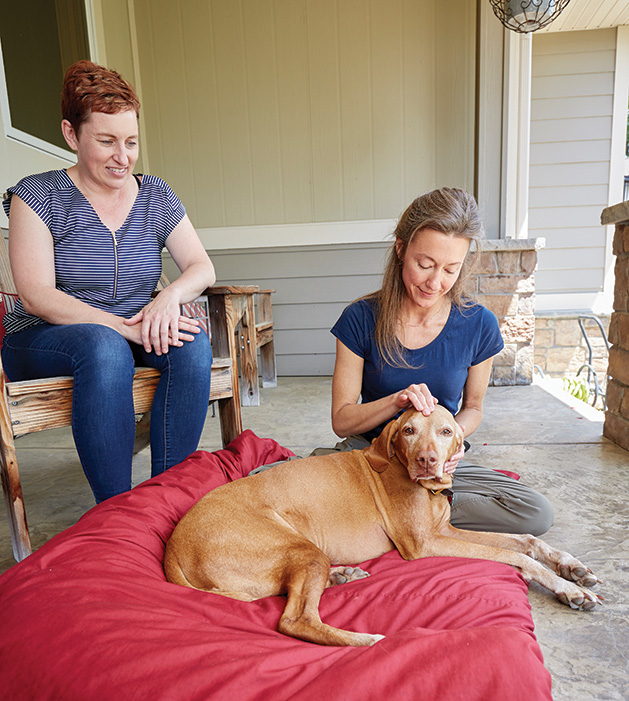
Photo: Tate Carlson
Hudson woman uses holistic practices to help ill and aging animals.
Animals have always been a big part of Sarah Bertsch’s family. She and her husband have only ever had canine “children.” And when their rescued golden doodle Ellie was diagnosed with an aggressive form of cancer, Bertsch set off to research how best to help Ellie, just like any parent would.
“We were in shock when we got the diagnosis,” Bertsch says. “We couldn’t believe that even with the most advanced technologies available to us, her lifespan would be so short.” Bertsch was fully engaged with the veterinary oncology staff at the University of Minnesota but wanted to know more about how to make Ellie’s end-of-life experience be as positive as it could be.
She started reading The Dog Cancer Survival Guide by Demian Dressler which she recommends other dog owners read in advance of ever needing to. “I learned so much about nutrition,” she says. “There is also a whole section about complimentary healing methods [like acupressure and reiki] and I felt a strong connection to the way it was explained and how people used it with their animals.” Bertsch wanted to learn more; what holistic methods are and how they work. In the beginning, she “didn’t even know acupressure was founded for humans. My whole focus was my dog,” she explains. So once Bertsch had personal experience from other practitioners of acupressure, she discovered what a wonderful first step it would be for her in the world of holistic work with animals.
Bertsch began with online and in-person classes in animal acupressure, an ancient Chinese practice described as the application of light pressure to specific sites on the body to control symptoms such as pain. It’s similar to acupuncture but without needles. Bertsch really likes being a student and feels that’s an important part of being in a healing field. “Individuals should not start out overly confident in their ability,” Bertsch says. “[You] need to first understand anatomy and pathology and when to call the vet.”
Bertsch notes the Chinese perspective sees physiological systems as being tied to emotions, and in the Western world, it’s hard to deal with emotions. “Animals [with emotional issues] are being increasingly treated with Prozac and that can mask the underlying problem,” Bertsch says. “It’s fascinating to study Chinese medicine and the focus on emotions and how they relate to physiological systems.”
For example, Bertsch notes there is physical pain and emotional pain. Older animals with hip problems may never reestablish the mobility of their youth, but methods such as acupressure address physical pain and also the frustration and depression the animal may be having. “There is this whole area of healthcare for humans and animals that can really address this,” says Bertsch. She also appreciates the benefits of these practices in her own life that help her maintain a better emotional and physical balance and has expanded her understanding of the Chinese method of keeping the body in balance with the environment.
Bertsch studied with the Tall Grass Animal Acupressure Institute and began holistic practices with small animals for a couple of years. She eventually expanded into equine treatments. “I wanted to expand my perspective of understanding even further,” she says. So, she began searching for more instruction and just the right teacher to help her with equine acupressure. “I’m also a teaching and performing violinist,” Bertsch says. “I feel stronger having had different teachers and know how wonderful it is to connect with the right teacher.” That’s how Bertsch felt when she connected with a woman in Santa Rosa, Calif. who helped her expand her knowledge into equine acupressure. “There is also a national licensing body called the National Board of Certification for Animal Acupressure and Massage,” says Bertsch. “I went through the extra training and licensing for small animal acupressure. It keeps me constantly brushing up on my skills.”
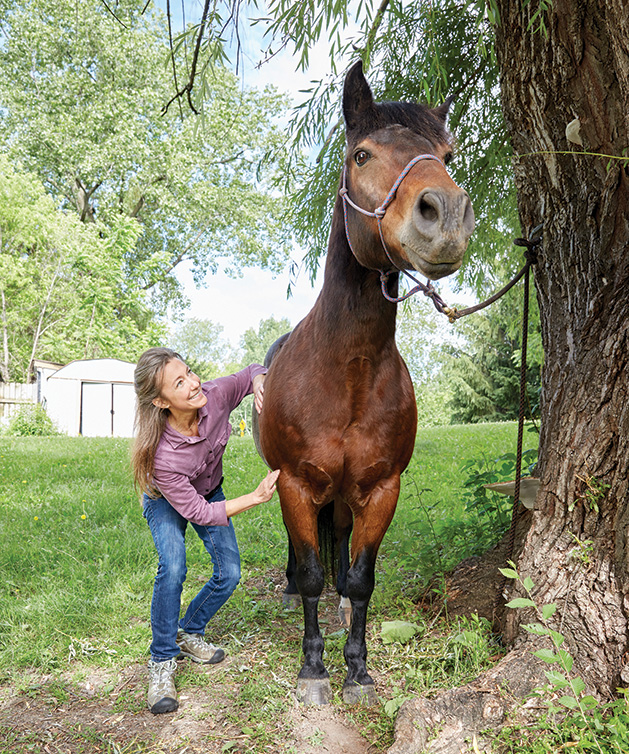
Holistic health for animals is a growing field. A story in Business Wire states “a health-conscious society is creating the desire for holistic health options for both themselves and their pets. According to the National Center for Health Statistics, Americans spent approximately $30.2 billion in 2012 on holistic health approaches for themselves and their family. With pets increasingly being referred to as members of the family, this demonstrates a trend that will soon impact the pet healthcare industry.”
“It’s fun to see people open their minds more to the concept of holistic help,” says Bertsch. “I’m not either/or. Of course, pet owners should go to the vet and I advocate for Western medicine. But some pet parents want to explore all other options [like acupressure and reiki].”
Bertsch describes her study of reiki, a Japanese method, as being more generally aware of the energy of an animal and offering the animal an opportunity to realign any imbalances, noting there must be an acceptance of a “greater good” in the process. She says, “I might intend for the energy to help pain but ultimately the greatest good may not be what we can see. Maybe the greatest good isn’t as we expect but what will work out in the end.”
Bertsch’s compassion for animals and her experience with her own pet has led her mostly in the direction of helping animals nearing the end of their lives. She appreciates that people trust her enough to invite her into their homes and barns to develop bonds with their animals, and also with the humans. “We discuss things in life,” she says. “Those things may be affecting their animal.”
“I get to travel with families through some painful chapters of life with these animals,” she says. “Some animals are very aged or in critical condition when I’m called, often as a last choice before euthanizing, as I may be able to help an animal gain some strength and a little more life, to get well enough to have a positive chapter before saying goodbye, to relax and sleep well with less pain, even if their cancer isn’t going away.”
The animals Bertsch treats become her friends. She comes to love them. She works with young and healthy animals but, “sometimes I’ll see an animal for the first time, like this really old cat that could hardly stand up. I got to know it and did some work with it, and later I got in the car and sobbed. It’s sad that life is short, and it dwindles, and we go through a transition. But it’s also beautiful … so by default I’ve been specializing in elderly animals. They just have more issues, much like humans. It is such a privilege to do this work,” she says.
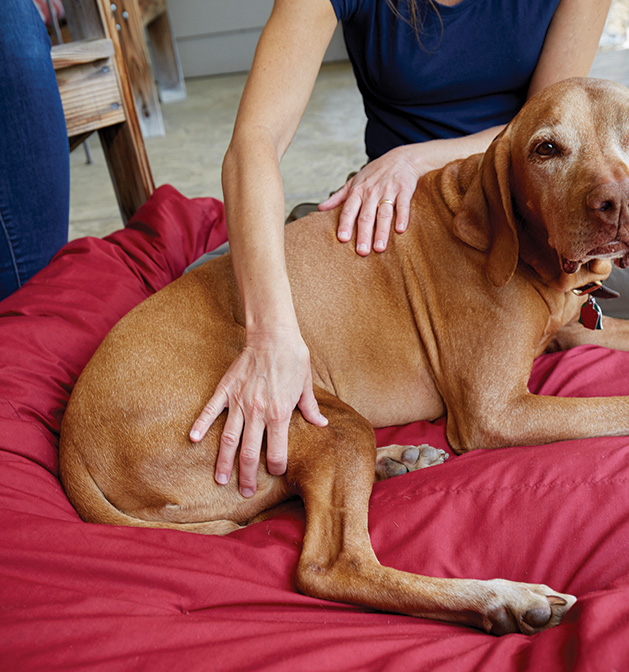
Benefits from acupressure and/or reiki can include:
- Stress relief
- Reduced anxiety
- Mood elevation
- Mental clarity
- Emotional calming
- Improved flexibility
- Hastened recovery
- Reduced inflammation
- Increased circulation
- Improved digestion
- Strengthened immunity
- Healthier aging
- Comfort at end-of-life
Optimal Animals, LLC
sarah@optimalanimals.com
612.709.5405
If you’d like to learn more, Bertsch does presentations and offers classes to clubs, school groups and organizations. These include but aren’t limited to:
- Animal Lover’s Intro to Acupressure & Traditional Chinese Medicine
- Acupoints Every Animal Lover Should Know
- Acupressure for Breed-Specific Concerns
- Acupressure for Elderly Animals
- Reiki Level One
Custom classes are also available.

